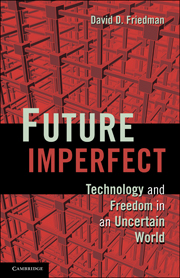Book contents
14 - The More You Know…
Published online by Cambridge University Press: 18 August 2009
Summary
The previous chapter discussed changes in what we can do to ourselves and our descendants, and possible consequences. This chapter discusses changes in what we know – and possible consequences. More knowledge is, on the whole, a good thing – but there may be exceptions.
WISE FATHERS
Human mating patterns have varied a good deal across time and space, but long-term monogamy is far and away the most common. This pattern – male and female forming a mated pair and remaining together for an extended period of time – is uncommon in other mammalian species. It is, oddly enough, very common among birds, possibly because their offspring, like ours, require extended parental care. Swans and geese, for example, have long been known to mate for life.
Modern research has shown that the behavior of most varieties of mated birds is even closer to that of humans than we once supposed. As with humans, the norm is monogamy tempered by adultery. While a mated pair will raise successive families of chicks together, a significant fraction of those chicks – genetic testing suggests figures from 10 to 40% – are not the offspring of the male member of the pair. Similar experiments are harder to arrange with humans, but such work as has been done suggests that some significant percentage – estimates range from about 1 in 100 to 1 in 3 – of the children of married women cohabiting with their husbands are fathered by someone else.
- Type
- Chapter
- Information
- Future ImperfectTechnology and Freedom in an Uncertain World, pp. 202 - 215Publisher: Cambridge University PressPrint publication year: 2008



